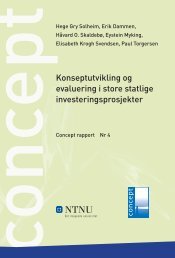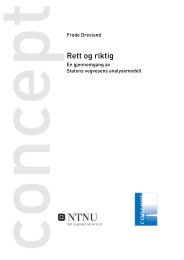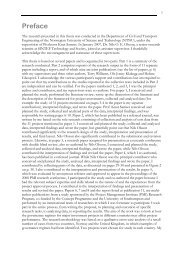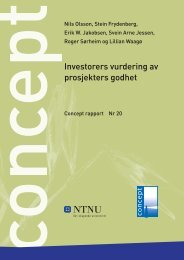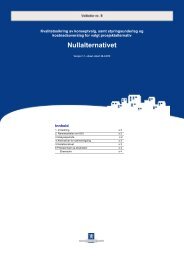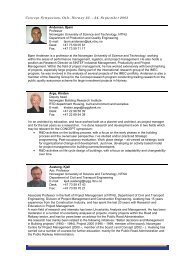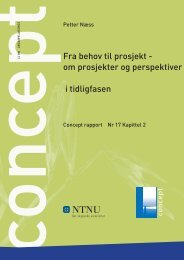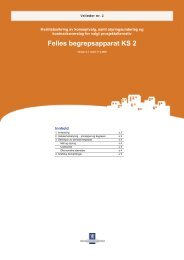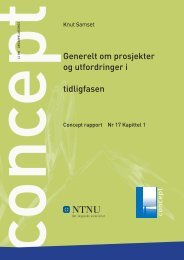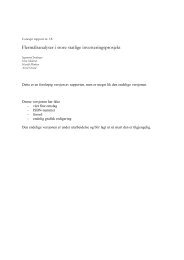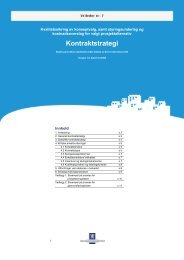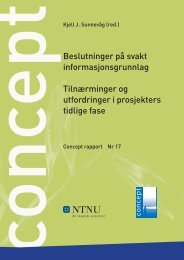FLEXIBILITY IN ENGINEERING PROJECTS: BLESSING OR CURSE?Nils O. E. Olsson [The Norwegian University of Science and Technology]ABSTRACTDepartment of Civil and Transport Engineeringnils.olsson@ntnu.noThis paper gives an overview of research on project flexibility in engineering projects. Projectflexibility is viewed from different perspectives. Firstly, the concept of flexibility in projects isdiscussed. Secondly, the cases against and in favour of flexibility are presented. Finally, a shor<strong>to</strong>verview is made <strong>to</strong> identify under which circumstances and during which part of a project thatflexibility proves most useful and most damaging. The paper suggests that project owners are morelikely <strong>to</strong> be in favour of flexibility than contrac<strong>to</strong>rs. Viewed in a time perspective, flexibility in thefront-end phase could help <strong>to</strong> increase the probability of success, while flexibility in the executionphase is claimed <strong>to</strong> reduce efficiency of projects. Furthermore, industrial development projects aremore likely <strong>to</strong> benefit from flexibility than civil engineering projects are. Related <strong>to</strong> the degree ofuncertainty, flexibility is claimed <strong>to</strong> be desirable in high uncertainty environments and less important insituations with low uncertainty. Flexibility is discussed as a double-edged sword. Flexibility for onestakeholder is often viewed as another's risk. The case in favour of flexibility emphasise the possibility<strong>to</strong> increase a project’s effectiveness while the case against flexibility highlights that it might reduceefficiency. Project flexibility can be used <strong>to</strong> increase the project owner’s value of a project. The majordrawbacks lie in the negative effects of changes on the project organizations and a possible frustrationregarding lack of decisions and commitment.KEYWORDSProject, Management, Flexibility, Efficiency, Effectiveness.1. INTRODUCTIONThe ability <strong>to</strong> adapt <strong>to</strong> changes along with short response time is heavily emphasised in disciplines suchas strategic management and supply chain management (Bettis & Hitt, 1995). However, study afterstudy (including Hall, 1980; Morris & Hough, 1991; Miller & Lessard 2000) indicate that a clearproject definition is a key success criterion for projects. It appears as a paradox that the mainstream ofproject management focuses on stability for the project, while major parts of other managementdisciplines strongly emphasise flexibility.The purpose of this paper is <strong>to</strong> give an overview of research on project flexibility in engineeringprojects. The following issues are covered: (1) the concept of flexibility in projects, (2) the casesagainst and in favour of flexibility and (3) under which circumstances and during which part of aproject that flexibility proves most useful or most damaging. While many authors on the issue offlexibility have clear standing in favour or against the use of flexibility in projects, the paper is anattempt <strong>to</strong> summarise the arguments used by both sides.Research methodologyThe paper is based primarily on literature search of flexibility management in projects. However, thepresentation is also influenced by a number of case studies and personal experience from consultingand research engagements. In the case studies, a research methodology based on the works of Yin(2003) regarding case studies as a qualitative paradigm has been used. One of the characteristics ofcase studies is that multiple sources of information are used, including archives, interviews andobservations. The research has primarily been of a qualitative nature.
The concept of project flexibilityFlexibility management as a systematic approach is not a new concept. Sager (1990) found severalexamples of flexibility as one approach <strong>to</strong> prepare for the effects of uncertainty in planning. However,Sager also points out that flexibility is an important term very often used by planners but rarelyscrutinized theoretically.One approach <strong>to</strong> project flexibility is based on theory related <strong>to</strong> financial options, referred <strong>to</strong> byBrennan & Trigeoris (2000) as the real options paradigm. In this paradigm, flexibility is compared <strong>to</strong>owning an option - the right, but not the obligation <strong>to</strong> take an action in the future (Amram & Kulatlaka,1999).Koskela (2000) describes how production principles such as just-in-time has been adopted in atheoretical framework aimed at the construction industry under the term lean construction. In thisframework, the term “last responsive moment” is used <strong>to</strong> achieve flexibility in projects (Ballard &Howell, 2003). According <strong>to</strong> Ballard & Howell (2003), the last responsive moment means thatdecisions must be made within the lead time for realizing alternatives and that a decision should not bemade until it has <strong>to</strong> be made.Mandelbaum & Buzacott (1990) uses the number of the remaining alternatives after a decision hasbeen taken as a measure of flexibility. Eikeland (2001) discusses “room for manoeuvring” related <strong>to</strong>project flexibility. He relates “room for manoeuvring” <strong>to</strong> the internal uncertainty of the project,represented by future yet undetermined internal decisions. According <strong>to</strong> Eikeland (2001), a decision iswithin the room for manoeuvring if it does not violate the consequences of previous decisions. Termslike adaptability and robustness are often used when discussing issues related <strong>to</strong> what this paper callsflexibility. Flexibility may also be described as a way of making irreversible decision more reversibleor postponing irreversible decisions until more information is available.Note that flexibility as discussed in this paper is not seen as an alternative <strong>to</strong> strategic management, butas a means <strong>to</strong> help realising a strategy, in the way that Samset (1998) argues that successful projects arecharacterised by a distinct strategy in combination with sufficient tactical flexibility.Flexibility in the process and the productFlexibility in a project can be associated with the process or the product. The former refers <strong>to</strong> flexibilityin the project’s decision process. The real-options paradigm recognises that decisions are madesequentially over episodes. The use of decision gate models provides a successive commitment <strong>to</strong> aproject, including the possibility of iterations, as shown by Eskerod & Östergren (2000). Thephilosophy of not taking decisions until the last responsible moment, as shown by Ballard & Howell(2003) is also an example of flexibility in the decision process. The latter refers <strong>to</strong> the effects of aproject, in the sense that the final product of the project is prepared for alternative use. This approach <strong>to</strong>flexibility is used in office building construction, as described in Brand (1994) and Blakkstad (2001),where the need for adaptability is well known.Efficiency and effectivenessIn this paper, the term efficiency is linked <strong>to</strong> the immediate outcome of a project. It is a question ofdoing things right and producing project outputs in terms of the agreed scope, quality, cost and time. Itis an internal measure related <strong>to</strong> what Samset (1998) refers <strong>to</strong> as the project or contrac<strong>to</strong>r perspective.The term effectiveness is linked <strong>to</strong> the longer-term effects of the project, or in other words, <strong>to</strong> do theright things. It is an external measure. Eikeland (2001) relates effectiveness <strong>to</strong> how the results of aproject contribute <strong>to</strong> value added for owners and users. According <strong>to</strong> Samset (1998), effectivenessmeasures the realization of the project’s purpose, or the project’s long-term consequences. This is theperspective of the project owner or financing party, who <strong>to</strong> a large extent have a similar perspective asthe users.2
- Page 1 and 2:
ISBN 82-471-8121-5 (printed ver.)IS
- Page 3:
Preface and AcknowledgementsThe wor
- Page 7 and 8:
Table of ContentsPreface and Acknow
- Page 9 and 10:
Paper OverviewThe following papers
- Page 11 and 12:
AbstractTraditionally, projects ten
- Page 13 and 14:
alternative use. There are indicati
- Page 15 and 16:
1. Introduction1. IntroductionThis
- Page 17 and 18:
1. IntroductionFlexible projects ar
- Page 19 and 20:
1. IntroductionA literature review
- Page 21 and 22:
2. Study design2. Study designThe r
- Page 23 and 24:
2. Study designInformation Content
- Page 25 and 26:
3. Flexibility in different project
- Page 27 and 28:
3. Flexibility in different project
- Page 29 and 30:
3. Flexibility in different project
- Page 31 and 32:
4. Project stakeholders4. Project s
- Page 33 and 34:
4. Project stakeholdersmandatory qu
- Page 35 and 36:
4. Project stakeholdersBased on res
- Page 37 and 38:
5. Effectiveness and efficiency5. E
- Page 39 and 40:
5. Effectiveness and efficiencyconf
- Page 41 and 42:
5. Effectiveness and efficiencyDegr
- Page 43 and 44:
6. Project flexibility categorisati
- Page 45 and 46:
6. Project flexibility categorisati
- Page 47 and 48:
6. Project flexibility categorisati
- Page 49 and 50:
7. Conclusions7. ConclusionsThis th
- Page 51 and 52:
7. ConclusionsProject phasesFlexibi
- Page 53 and 54:
7. ConclusionsEnablersThis thesis r
- Page 55 and 56:
7. Conclusions16, Figure 17, and Fi
- Page 57 and 58:
7. Conclusions4. AbsorptionAbsorpti
- Page 59 and 60: 7. ConclusionsThere appears to be a
- Page 61 and 62: ReferencesAbbot, A. & Banerji, K. 2
- Page 63 and 64: Gareis, R. 2004. Maturity of the Pr
- Page 65 and 66: Miller, R. & Lessard, D. 2000. The
- Page 67 and 68: Part 2.
- Page 69 and 70: Paper 1.Olsson, N.O.E. 2006. Manage
- Page 71 and 72: N.O.E. Olsson / International Journ
- Page 73 and 74: N.O.E. Olsson / International Journ
- Page 75 and 76: N.O.E. Olsson / International Journ
- Page 77 and 78: N.O.E. Olsson / International Journ
- Page 79 and 80: Paper 2.Magnussen, O.M. & Olsson, N
- Page 81 and 82: 282 O.M. Magnussen, N.O.E. Olsson /
- Page 83 and 84: 284 O.M. Magnussen, N.O.E. Olsson /
- Page 85 and 86: 286 O.M. Magnussen, N.O.E. Olsson /
- Page 87 and 88: 288 O.M. Magnussen, N.O.E. Olsson /
- Page 89 and 90: Projects trapped in their freedom:
- Page 91 and 92: 1. IntroductionThe purpose of this
- Page 93 and 94: project phases: preparation, freezi
- Page 95 and 96: establish realistic cost and time f
- Page 97 and 98: 4. ResultsIn the following, the emp
- Page 99 and 100: lowered the quality but the volume
- Page 101 and 102: Percent ofproject onSize of remaini
- Page 103 and 104: flexibility is introduced by the us
- Page 105 and 106: 100 %First official estimateApprova
- Page 107 and 108: ReferencesAndersen, B., Fagerhaug,
- Page 109: Paper 4.Olsson, N.O.E. 2004. ‘Fle
- Page 113 and 114: 3. CONCLUSIONSWhat seems to be impl
- Page 115 and 116: Paper 5.Olsson, N.O.E. 2006. ‘Imp
- Page 117 and 118: 558 N. O. E. Olsson et al.ex-post s
- Page 119 and 120: 560 N. O. E. Olsson et al.Table 1.O
- Page 121 and 122: 562 N. O. E. Olsson et al.and actua
- Page 123 and 124: 564 N. O. E. Olsson et al.Table 3.
- Page 125 and 126: 566 N. O. E. Olsson et al.Table 7.S
- Page 127 and 128: 568 N. O. E. Olsson et al.with a wi
- Page 129 and 130: Paper 6.Henriksen, B., Olsson, N. &
- Page 131 and 132: In this paper we use the process an
- Page 133 and 134: PROCESS ANALYSIS IN THE PLANNING OF
- Page 135 and 136: final framework for expected patien
- Page 137 and 138: User involvement also generated exp
- Page 139: Paper 7.Olsson, N.O.E. & Samset, K.
- Page 155 and 156: Project flexibility and front-end m
- Page 157 and 158: uncertainty. External flexibility c
- Page 159 and 160: 5.2. Flexibility in decision proces
- Page 161 and 162:
Degree of redundancySlackPrecisionC



